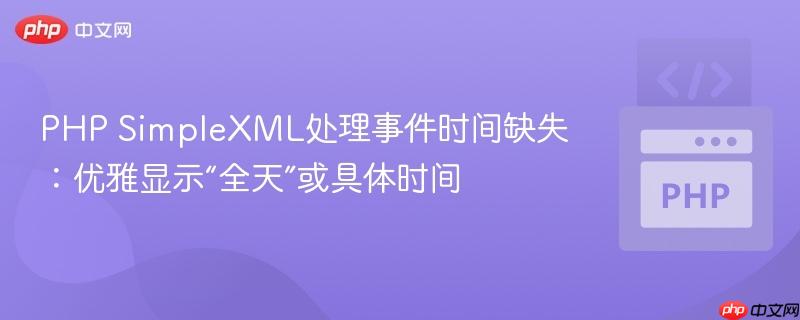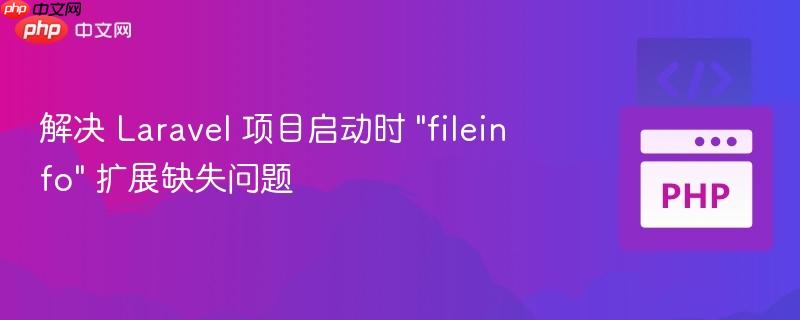
本教程探讨如何在使用PHP SimpleXML解析XML日历数据时,优雅地处理事件时间缺失问题。当XML中某些事件没有明确的开始和结束时间时,通过检查`alldayevent`字段,我们可以智能地将其显示为“All Day”,而对于包含具体时间的事件则正常展示,从而避免程序错误并优化信息呈现。
在开发基于XML数据源的应用程序时,我们经常会遇到数据结构不完全一致的情况。例如,一个日历事件XML feed可能包含全天事件,这些事件没有具体的开始和结束时间,而其他事件则有详细的时间段。直接尝试访问不存在的XML节点会导致PHP SimpleXML抛出错误或产生不期望的行为。本文将详细介绍如何使用PHP SimpleXML和XPath,结合条件逻辑,灵活处理这类可选字段。
原始问题分析
假设我们有一个XML数据源,其中包含事件信息,部分事件是全天事件,不包含 zuojiankuohaophpcnstarttime> 和 <endtime> 标签,但有一个 <alldayevent> 标签。
示例XML结构:
立即学习“PHP免费学习笔记(深入)”;
<event> <startdate>24/11/2021</startdate> <alldayevent>true</alldayevent> <description>Event 1</description> <category>Main Events</category></event><event> <startdate>24/11/2021</startdate> <alldayevent>false</alldayevent> <starttime>14:00</starttime> <endtime>16:30</endtime> <description>Event 2</description> <category>Main Events</category></event>登录后复制
如果使用以下PHP代码尝试直接提取 starttime 和 endtime:
// load xml file (假设 $url 已定义)$sxml = simplexml_load_file($url) or die("Error: Cannot create object");echo '<div class="calendar">';$starts = $sxml->xpath('//event/startdate');$dates = array_unique($starts);foreach($dates as $date) { echo "<li><h1>{$date}</h1></li>" ."\n"; $expression = "//event/startdate[.='{$date}']"; $events = $sxml->xpath($expression); foreach ($events as $event){ // 当事件没有 starttime/endtime 时,这里会尝试访问不存在的元素,导致错误 echo "\t" , "<li><div class='time'>{$event->xpath('./following-sibling::starttime')[0]} - {$event->xpath('./following-sibling::endtime')[0]}</div><div class='event'><b> {$event->xpath('./following-sibling::description')[0]}</b> // {$event->xpath('./following-sibling::category')[0]}</div></li>"; echo "\n"; } echo "\n";}echo "</div>";登录后复制当 event 节点中缺少 <starttime> 或 <endtime> 时,$event->xpath('./following-sibling::starttime') 将返回一个空数组。此时,尝试访问 [0] 索引会导致PHP发出 Undefined offset: 0 的警告,并可能导致输出不完整或错误。
解决方案:条件判断与优雅处理
为了解决这个问题,我们需要在尝试显示时间之前,先判断事件是否为全天事件,或者是否存在具体的开始/结束时间。XML中的 <alldayevent> 标签为我们提供了关键信息。
 美间AI
美间AI 美间AI:让设计更简单
 45 查看详情
45 查看详情 
核心思路:
首先检查 alldayevent 标签是否存在且其值为 true。如果是全天事件,则直接显示“All Day”。如果不是全天事件,则尝试提取 starttime 和 endtime 并显示。在此过程中,也应检查这些时间标签是否存在,以增强代码的健壮性。修正后的PHP代码:
<?php// 假设 $url 指向您的XML文件路径// 例如: $url = 'path/to/your/calendar.xml';// 为演示目的,我们直接使用一个XML字符串$xml_string = <<<XML<root> <event> <startdate>24/11/2021</startdate> <alldayevent>true</alldayevent> <description>Event 1</description> <category>Main Events</category> </event> <event> <startdate>24/11/2021</startdate> <alldayevent>false</alldayevent> <starttime>14:00</starttime> <endtime>16:30</endtime> <description>Event 2</description> <category>Main Events</category> </event> <event> <startdate>25/11/2021</startdate> <alldayevent>false</alldayevent> <starttime>09:00</starttime> <description>Event 3 (Missing End Time)</description> <category>Meetings</category> </event> <event> <startdate>25/11/2021</startdate> <description>Event 4 (No Time Info)</description> <category>Other</category> </event></root>XML;$sxml = simplexml_load_string($xml_string) or die("Error: Cannot create object");echo '<div class="calendar">';# 搜索所有事件的开始日期$starts = $sxml->xpath('//event/startdate');# 获取唯一的开始日期$dates = array_unique(array_map('strval', $starts)); // 使用 array_map('strval', ...) 确保日期字符串化以便 array_unique 正确工作foreach($dates as $date) { echo "<li><h1>{$date}</h1></li>" ."\n"; # 搜索在当前日期发生的所有事件 $expression = "//event[startdate='{$date}']"; // XPath 表达式更精确地匹配事件 $events = $sxml->xpath($expression); # 遍历这些事件并查找其描述和时间 foreach ($events as $event){ $description = (string)$event->xpath('./description')[0]; $category = (string)$event->xpath('./category')[0]; // 检查 alldayevent 标签是否存在且其值为 'true' $alldayevent_node = $event->xpath('./alldayevent'); $is_allday = !empty($alldayevent_node) && ((string)$alldayevent_node[0] === "true"); $time_display = ''; if ($is_allday) { $time_display = 'All Day'; } else { // 尝试获取开始和结束时间 $starttime_node = $event->xpath('./starttime'); $endtime_node = $event->xpath('./endtime'); $starttime = !empty($starttime_node) ? (string)$starttime_node[0] : ''; $endtime = !empty($endtime_node) ? (string)$endtime_node[0] : ''; if ($starttime && $endtime) { $time_display = "{$starttime} - {$endtime}"; } else if ($starttime) { $time_display = $starttime; } else if ($endtime) { $time_display = $endtime; } else { // 如果不是全天事件但也没有提供任何时间信息 $time_display = 'Time Not Specified'; } } echo "\t" , "<li><div class='time'>{$time_display}</div><div class='event'><b> {$description}</b> // {$category}</div></li>\n"; } echo "\n";}echo "</div>";?>array_map('strval', $starts): xpath 返回的是 SimpleXMLElement 对象的数组。为了让 array_unique 能够正确比较这些对象的值(而不是对象本身),我们先将它们转换为字符串。$expression = "//event[startdate='{$date}']";: 优化了XPath表达式,直接匹配具有特定 startdate 的 event 节点,而不是先找到 startdate 再找其父节点。$description = (string)$event->xpath('./description')[0];: 在访问XPath结果的第一个元素时,使用 (string) 进行类型转换是一个好习惯,即使元素存在,也能确保得到一个字符串,而不是 SimpleXMLElement 对象。$alldayevent_node = $event->xpath('./alldayevent');: 获取 alldayevent 节点。XPath返回一个数组,即使只有一个结果。$is_allday = !empty($alldayevent_node) && ((string)$alldayevent_node[0] === "true");:!empty($alldayevent_node) 检查 alldayevent 节点是否存在。这是避免 Undefined offset: 0 错误的关键。((string)$alldayevent_node[0] === "true") 检查节点的值是否为字符串 "true"。使用 (string) 确保类型一致性。条件分支 (if ($is_allday) ... else ...): 根据 is_allday 的布尔值,决定显示“All Day”或尝试提取具体时间。时间提取的健壮性: 在 else 分支中,我们同样对 starttime_node 和 endtime_node 进行了 !empty() 检查,以防在非全天事件中,某个时间标签仍然缺失。这使得代码更加健壮。$time_display 变量: 使用一个临时变量来构建时间显示字符串,最后一次性输出,使逻辑更清晰。预期输出
根据上述修正后的代码和扩展的XML示例,预期输出将是:
<div class="calendar"><li><h1>24/11/2021</h1></li> <li><div class='time'>All Day</div><div class='event'><b> Event 1</b> // Main Events</div></li> <li><div class='time'>14:00 - 16:30</div><div class='event'><b> Event 2</b> // Main Events</div></li><li><h1>25/11/2021</h1></li> <li><div class='time'>09:00</div><div class='event'><b> Event 3 (Missing End Time)</b> // Meetings</div></li> <li><div class='time'>Time Not Specified</div><div class='event'><b> Event 4 (No Time Info)</b> // Other</div></li></div>登录后复制
注意事项与最佳实践
XPath结果的检查: 始终记住 xpath() 方法返回的是一个 SimpleXMLElement 对象的数组。在访问 [0] 索引之前,务必使用 !empty() 或 count() 检查数组是否为空,以避免“Undefined offset”警告。类型转换: 当从 SimpleXMLElement 对象中提取值时,使用 (string) 进行显式类型转换是一个好习惯,可以确保你得到的是一个字符串,而不是一个对象,这在比较或拼接字符串时尤为重要。错误处理: simplexml_load_file() 或 simplexml_load_string() 后的 or die("Error: Cannot create object"); 语句在生产环境中应替换为更完善的错误处理机制,例如抛出异常或返回错误信息,以便调用方能更优雅地处理。XML结构依赖: 本解决方案高度依赖于XML中 alldayevent 字段的准确性和存在性。如果XML结构可能变化,需要更灵活的解析策略。CSS样式: 输出的HTML中使用了 div 和 li 标签,并带有 class='time' 和 class='event'。建议结合CSS进行美化,以达到更好的视觉效果。代码可读性: 对于复杂的条件判断,可以考虑将逻辑封装到辅助函数中,提高代码的可读性和复用性。总结
通过本教程,我们学习了如何在使用PHP SimpleXML解析具有可选字段的XML数据时,通过结合XPath和条件逻辑来优雅地处理数据缺失问题。关键在于对XPath返回结果进行存在性检查,并根据业务逻辑(如 alldayevent 标志)动态调整内容的显示方式。这种方法不仅避免了程序错误,还显著提升了用户体验,使得应用程序能够更健壮、更灵活地处理多样化的XML数据。
以上就是PHP SimpleXML处理事件时间缺失:优雅显示“全天”或具体时间的详细内容,更多请关注php中文网其它相关文章!











